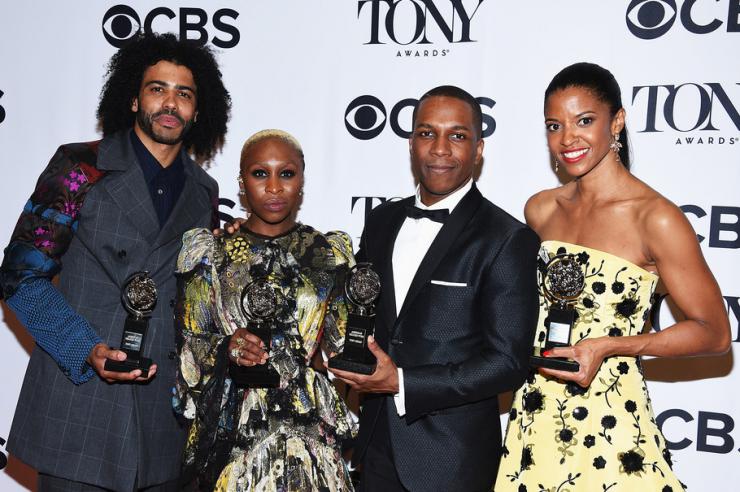Broadway Plays Contradict #TonysSoDiverse

The 2016 Tony Awards Ceremony was a historic night when four actors of color won all of the best performance awards in a musical category. That, along with the slew of wins for Hamilton, reinforced the notion that “Diversity is the theme of the entire season.” Well, for musicals that is.
Somewhat overshadowed by the #TonysSoDiverse hype of the evening were the best performance awards in a play category: all four went to white actors over the age of sixty. After such an exciting season on Broadway, where productions finally reflected the zeitgeist of our times, are Broadway plays lagging dangerously behind?
Broadway musicals have received the brunt of pressure to increase diversity on their stages. Plays, on the other hand, have been construed as more inclusive and progressive. In fact, Broadway plays are older and whiter than we may have realized. Of the 2015-16 season’s twenty play productions, Danai Gurira’s Eclipsed was the only play whose cast was entirely people—women—of color. The fact that this year’s award winners are nearly twice the age of Eclipsed star Lupita Nyong’o is also unsettling.
Young playwrights and theatremakers are creating more work with more diverse perspectives than ever before, but Broadway casts are still dominated by white actors. Veteran actors have set the foundation for twenty-first century American theatre.
The talent of the award winners should not be diminished. In fact, they celebrated historic wins. Frank Langella, a longtime veteran of the Great White Way, took home his fourth Tony at the age of seventy-eight, making him the oldest ever Tony award winner. The other three actors, Reed Birney, Jayne Houdyshell, and Jessica Lange, each received their first Tony Award, despite the fact that they have performed in a combined eighteen Broadway productions over several decades.
“I've never been one to rush into things, but the fact that at the age of sixty-two, forty-two years into [my] career, that this should come my way,” Houdyshell said in her acceptance speech. “The depth of my gratitude is really, really, really profound.”
Many praised the long overdue honors. Some spectators relished the reminiscence of an older (and whiter) generation of performers on Broadway, including The New York Times’ Mike Hale:
The presence of Ms. Lange, Mr. Langella, and Ms. Streisand, along with those of Jane Houdyshell and Reed Birney of The Humans—who both spoke movingly of what it meant to win a Tony after a long career onstage—gave a strong flavor of nostalgia and veteran professionalism to a show that was supposed to be dominated by the youthful cast and hip-hop rhythms of Hamilton.
Hale suggests that Broadway should be threatened by the new standards Hamilton and other new and predominantly young musicals are setting. But should it? The Humans and The Father were both written by 36-year-old (albeit white) men. Ironically, youthful playwrights are giving voice to older generations. But are those the stories Broadway needs? Young playwrights and theatremakers are creating more work with more diverse perspectives than ever before, but Broadway casts are still dominated by white actors. Veteran actors have set the foundation for twenty-first century American theatre, of course, and yes, the stories of older people are important to share. But Broadway plays need to push diversity and inclusion as much as Broadway musicals currently are.
Are we to suppose that one white person balances out the rest of humanity lumped together as nondescript ‘people of color’? —August Wilson
Sadly, looking ahead at the 2016-17 season gives little hope. Of the thirteen plays already slated for Broadway stages next season, only one play—once again—has a cast entirely of people of color—a revival of August Wilson’s Jitney. Coincidentally, 2016 marks the twentieth anniversary of Wilson’s landmark “The Ground on Which I Stand” speech that ignited debates about casting and racial equity in twentieth century American theatre. And we are still talking about it two decades later.
Wilson said:
“We [do not] need the recognition of our blackness to be couched in abstract phrases like ‘artist of color.’ Who are you talking about? A Japanese artist? An Eskimo? A Filipino? A Mexican? A Cambodian? A Nigerian? Are we to suppose that one white person balances out the rest of humanity lumped together as nondescript ‘people of color’? We reject that. We are unique, and we are specific.”
The urgency of Wilson’s speech then is just as self-evident now. More opportunities for non-white actors are—and must continue—springing up on Broadway. More opportunities for non-white playwrights, directors, designers, and producers are necessary too. Theatremakers across the country are hankering to tell stories (on Broadway and off) of African-Americans, Asian Americans, Hispanic and Latin Americans, and so many others. As Frank Langella said in his Tony acceptance speech, “The fact of the matter is there really [isn’t a too] late in an actor’s career; there’s just the journey, and there’s just now.” Now more than ever, we need to bring diverse stories to our stages.
It will only be a matter of time before the young, talented people of color winning today’s awards will be playing the older roles that Birney, Houdyshell, Lange, and Langella are being celebrated for. August Wilson was part of the Baby Boomer generation, and the next wave of major black playwrights in American theatre have already emerged. We shouldn’t have to push and shove to make room for their stories on Broadway. The #TonysSoDiverse standard should apply to and celebrate plays as much as musicals. Wilson’s vision needs to become a reality, no matter how many years later.


Comments
The article is just the start of the conversation—we want to know what you think about this subject, too! HowlRound is a space for knowledge-sharing, and we welcome spirited, thoughtful, and on-topic dialogue. Find our full comments policy here
There is a noticeable difference between musicals and plays in diversity, and I do think it is important for there to be more diversity among plays. I do think that Hamilton was really the first show to strike up this conversation because of how different it was compared to everything else. It really did show that people are people no matter what color or how old they are. And I believe that this was such a big deal in Hamilton because people did question why the founder fathers weren’t played by white men. It then started a conversation that people began to back up very quickly with people are people no matter what. Everyone generally has the same human emotions and generally the same goals and to be loved. I think that by having more conversation about things along those lines, plays will become more diverse very soon. Casting directors will be more willing to cast outside the boundaries of what the play write has decided in older shows. And as younger generation play writes become more known, the diversity in their shows will begin to capture Broadway plays. By simply starting the conversation about diversity, things are bound to become better and change in society.
The Tonys did show diversity especially compared to the Oscars. Many are saying its not enough. Although this is true, we are taking one step forward, it takes time to change history and society beliefs. White people dominate when it comes to casting, but this past season has shown that everyone has talent, no matter what ethnicity. With each seasons that pasts we will get more playwrights are steer away from the status quo. Like Wilson said “it’s not too late” and I believe that to be true. With each new season that accepts diversity, it will spark the younger generations to do the same.
To discuss keeping #TonysSoDiverse, we must also talk about the role that Off-Broadway and regional theaters played in being the pipeline/incubator of shows such as the revival of "Spring Awakening" with deaf and disabled artists, "Hamilton," "Eclipsed," "Allegiance," and others. In a blog for NYPL, I wrote about how there are shows in the upcoming season are worthy of being transferred and need to. https://www.nypl.org/blog/2...